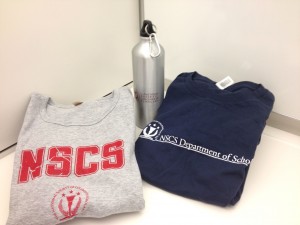Today we’re giving away an NSCS water bottle and t-shirts. T-shirts are a women’s and a men’s large – you get both! All you need to do is read the blog post below and leave a comment!
I think a lot about security in my role as the IT Director of NSCS. We are always under attack, everyone is, but there are some things you can do to protect yourself. The easiest thing is to use good passwords everywhere you can and try not to repeat the same password on different sites. This is a huge challenge if you are password challenged as I am. I have a terrible memory for passwords, but I have found some great tools to help me out and make me safer.
First let’s take a very short look at what makes a good password. The first thing is length, the longer a password is the harder it is to crack. On sites that allow it I use a minimum of 25 characters in my passwords using upper and lower case characters, numbers and special characters. This makes for a tough password to break, but also a password impossible to memorize such as $N:&?Qr@4xXy2u`=xp;gKI*?T, so I use a password manager to keep all my passwords in order. A password manager uses one master password you memorize to open the manager, but it stores all the difficult passwords for you and will normally load them into the login forms for most web sites automatically.
For quite awhile I used Onepass and it worked great, it works on almost all PCs and phones and is simple to set up and manage. The downside for me was cost, each device is separate purchase and it began to add up. I would still be using it if I were not on so many different devices.
I moved to Keepass. It is open source and free and with some variants it is available on all the different computers and phones I use. I use one master file for all the devices that I keep on Dropbox to keep this master file synced up between everything. Keepass has plugins for most browsers so you can have the passwords put in automatically when go to a site, although some sites use custom coding to prevent that and require you to cut and paste a password in.
Password managers and long complicated passwords won’t eliminate all risks, but it does remove my worry when I hear a website has been looted for its user information, even if someone cracks my password for that site they can only get into the one site. For many people if crooks break the password on their football team’s fan site, they now have the password they use on all sites, and that is really scary.
 Brett Abbott is a graduate of the University of Maryland University College and a long time systems manager who is now working with all the ins and outs of cloud based systems supporting a highly mobile user base. Working at NSCS has given him a new appreciation of how computer usage is evolving and how important it is for IT managers to keep up. When not at work Brett works on websites, loses to his son at computer games and hikes with his family as much as he can.
Brett Abbott is a graduate of the University of Maryland University College and a long time systems manager who is now working with all the ins and outs of cloud based systems supporting a highly mobile user base. Working at NSCS has given him a new appreciation of how computer usage is evolving and how important it is for IT managers to keep up. When not at work Brett works on websites, loses to his son at computer games and hikes with his family as much as he can.

